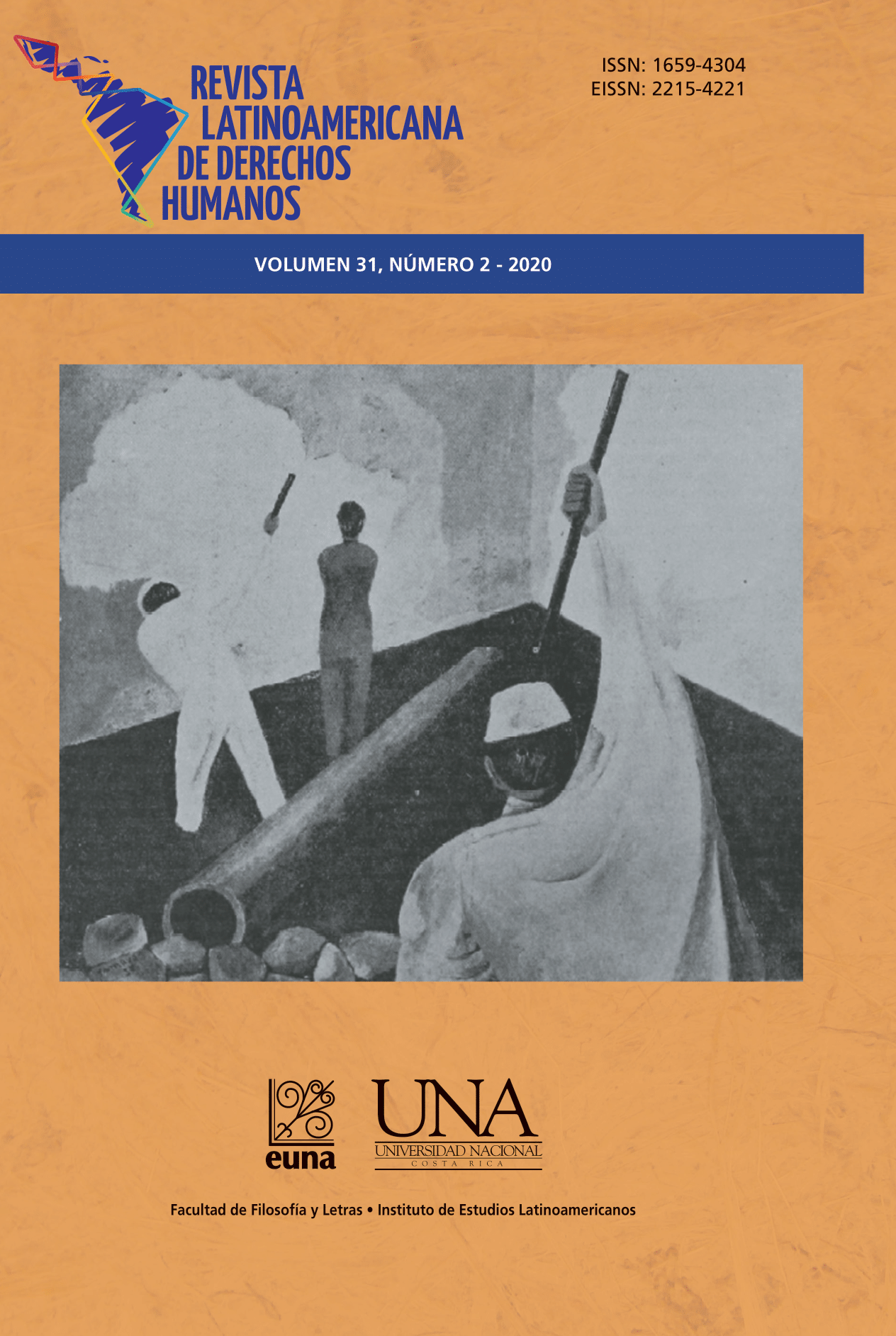From rights to duties: The ethical imprint of human rights based on the responsibility to protect
DOI:
https://doi.org/10.15359/rldh.31-2.2Keywords:
Responsibility to protect, Human rights, Rights of otherness, Ethics, Public international lawAbstract
The objective of this work is to propose, from an ethical perspective, a rethinking of the principle of “responsibility to protect”. It starts from the premise that the violence generated by the intervention on any alterity is a reflection of the modern roots of contemporary rights and its individualistic postulates, based on the extreme defense of identity. It is proposed to review these postulates through a reformulation of the legal concept of responsibility to protect, in order to propose an ethical approach to human rights, as rights of alterity. This means, in definitive, a rethinking of the terms of global coexistence: sociality is not constituted by addition of identities, but as an excess of responsibilities.
References
Abensour, M. (2005). La extravagante hipótesis. Revista de Filosofía, 61, 169–196.
AGNU, Asamblea General de Naciones Unidas. (2005). Documento Final de la Cumbre Mundial de 2005. Resolución A/RES/60/1.
Annan, K. (2005). Un concepto más amplio de la libertad: Desarrollo, seguridad y derechos humanos para todos. Informe del Secretario General Kofi Annan para la Cumbre Mundial 2005. AGNU: A/59/2005.
Añaños Meza, C. (2010). La “responsabilidad de proteger” en Naciones Unidas y la doctrina de la “responsabilidad de proteger.” Anuario Mexicano de Derecho Internacional, 10, 199–244. https://doi.org/10.22201/iij.24487872e.2010.10.323
Barboza, J. (2008). Derecho internacional público (2.da Ed.). Zavalia.
Bernstorff, J. (2012). Land Grabbing und Menschenrechte: die FAO Voluntary Guidelines on the Responsible Governance of Tenure. Die FAO Voluntary Guidelines on the Responsible Governance of Tenure. Duisburg: INEF. Retrieved from http://www.humanrights-business.org/files/landgrabbing_final_1.pdf
Bonet de Viola, A. M. (2018). Derechos sociales, normas de acceso y democracia. La agenda de los derechos humanos para una convivencia solidaria. Revista Latinoamericana de Derecho Social, 26, 3–27. https://doi.org/10.22201/iij.24487899e.2018.26.11858
Bosé, M., & Fernández Puyana, D. (2017). La historia de la paz en Occidente. UNESCO, University for Peace.
Cendejas Guízar, J., & Merino Pérez, L. (2016). Acción colectiva en la construcción social de la paz y la seguridad. La paz y la seguridad como bienes comunes. Cultura y Representaciones Sociales, 10(20), 9–41.
Chandler, D. (2004). The Responsibility to Protect? Imposing the ‘Liberal Peace.’ International Pacekeeping, 11(1), 59–81. https://doi.org/10.1080/1353331042000228454
Ciaramelli, F. (2003). Lo spazio simbolico della democrazia. Città Aperta ed.
Ciaramelli, F. (2009). Instituciones y normas: Sociedad global y filosofía del derecho. Trotta.
Chimni, B. S. (2006). Third World Approaches to International Law: A Manifesto. International Community Law Review, 8(1), 3–27. https://doi.org/10.1163/187197306779173220
Davy, U., & Lenzen, M. (2013). Einleitung: Demokratie morgen. In U. Davy & M. Lenzen (Eds.), Demokratie morgen. Überlegungen aus Wissenschaft und Politik (pp. 7–15). Transcript. https://doi.org/10.14361/transcript.9783839423875.intro
Derrida, J. (1998). Políticas de la amistad. Trotta.
Derrida, J. (2000). Dar la muerte. Paidos.
Derrida, J. (2001). ¡Palabra! Instantáneas filosóficas. Trotta.
Deutscher Ethikrat (2011): Die Ernährung der Weltbevölkerung – eine ethische Herausforderung. Tagungsdokumentation – Vorträge der Jahrestagung des Deutschen Ethikrates. Berlin.
Diez de Velasco, M. (2013). Instituciones del derecho internacional público. TecnosMa.
GAN, Grupo de Alto Nivel del Secretario General sobre las amenazas los desafíos y el cambio. (2004). Un mundo más seguro: La responsabilidad que compartimos. Naciones Unidas.
Habermas, J. (1999). Der interkulturelle Diskurs über Menschenrechte. In M. Brunkhorst, Hauke, Köhler, Wolfgang; Lutz-Bachmann (Ed.), Recht auf Menschenrechte : Menschenrechte, Demokratie und internationale Politik (pp. 216–227). Suhrkamp.
Hobbes, T. (2003). Leviatán. Losada.
Howard, M. (2000). La invención de la paz. Reflexiones sobre la guerra y el orden internacional. Salvat.
Hughes, C. L. (1998). The primacy of ethics: Hobbes and Levinas. Continental Philosophy Review, 31(1), 79–94–79–94. https://doi.org/10.1023/A:1010089805428
ICISS, International Commission on Intervention and State Soveraignity. (2001). La responsabilidad de proteger. Autor.
Leal Moya, L. (2005). Seguridad humana. La responsabilidad de proteger. Boletín Mexicano de Derecho Comparado, XXXVIII, 1117–1138.
Levinas, E. (1991). Ética e infinito. Visor.
Levinas, E. (1994). El diálogo. Revista de Filosofia, 4(5), 7–22.
Levinas, E. (2001). Entre nosotros: Ensayos para pensar en otro. Pre-Textos.
Levinas, E. (2002). Fuera del sujeto. Caparrós Editores.
Levinas, E. (2004). Le primat de la raison pure pratique. Das Primat der reinen praktischen Vernunft. In N. Fischer (Ed.), Kants Metaphysik und Religionsphilosophie. Meiner Verlag.
Levinas, E. (2006). Paz y proximidad. Revista Laguna, 18, 143–151.
López-Jacoiste Díaz, E. (2006). La responsabilidad de proteger: Reflexiones sobre su fundamento y articulación. Anuario Español de Derecho Internacional, 22, 285–315.
Luengo Zarzoso, M. (2016). La responsabilidad de proteger como paradigma de la seguridad humana. Posición española y tipología militar. Boletín IEEE, 1(Enero - marzo), 990–1089.
Mattei, U. (2013). Bienes comunes. Un manifiesto. Trotta.
Messina, A. L. (2012). La paz como primer lenguaje. Paz y política. En E. Levinas. Ideas y Valores, 61(150), 145–167.
Obama, B. (2009, December 10). Nobel Peace Prize acceptance speech. Retrieved from http://www.msnbc.msn.com/id/34360743.
Penchaszadeh, A. P. (2011). Política, don y hospitalidad en el pensamiento de Jacques Derrida. Isegoría, 44, 257–271. https://doi.org/10.3989/isegoria.2011.i44.729
Piedrahita Ramírez, L. F. (2015). La soberanía como responsabilidad y los fundamentos del nuevo intervencionismo humanitario. Estudios de Filosofía, 51(51), 45–74. https://doi.org/10.17533/udea.ef.n51.a04
Teubner, G. (2010). Justicia autosubversiva: ¿Fórmula de contingencia o de trascendencia del derecho? Anales de La Cátedra Francisco Suárez, 44, 217–248.
Downloads
Published
How to Cite
Issue
Section
License
El material que se publica en esta Revista está bajo una licencia “Creative Commons” 3.0 Costa Rica (CC, Reconocimiento-NoComercial-SinObraDerivada 3.0 Costa Rica (CC BY-NC-ND 3.0 CR) . Esto significa que el material publicado en la revista se puede compartir (copiar y distribuir) en cualquier medio o formato considerando que se debe reconocer de forma adecuada la autoría del material y la fuente, no puede utilizarse con fines comerciales y no se aceptan las obras derivadas (remezclar, transformar o crear a partir del material).








